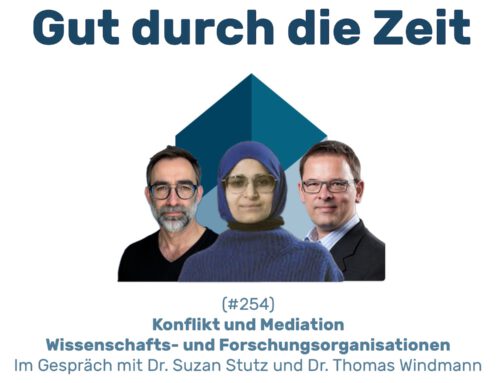INKOVEMA Podcast „Well through time“
#173 – Works council and internal conflict management
What role does mediation play here?
In conversation with Dr Marcus Bauckmann
Well through time. The podcast about mediation, conflict coaching and organisational consulting.
Dr Marcus Bauckmann, LL.M., Lawyer, certified mediator and mediation supervisor with his own law firm in Paderborn and Hamburg. He has lectured in (business) mediation at several universities. Since 2017, he has been Head of the Professional Status Department of the German Foundation for Mediation.
Contents:
1. the role of the works council in internal conflicts
In German companies Works councils (resp. in public organisations so-called staff councils and in church tendency companies so-called employee representatives) plays a decisive role when it comes to representing employee interests and safeguarding co-determination rights. It is governed by the Works constitution law (staff representation law or MAV law).
The – works council committees elected by the workforce of the companies are legally obliged to Represent the interests of the workforce vis-à-vis the employer. This includes, among other things Co-determination in personnel, social and economic matters.
Dealing with conflicts is a central aspect of works council work.
- Conflicts and interest work between employers and employeesThese can occur between employees and employers as well as within the works council body itself. In their role as employee representatives, works councils often have to enter into conflicts with the employer in order to protect and enforce the rights and interests of the workforce.
- Conflicts within the works council committee: However, tensions and conflicts can also arise within the works council committee. Differing opinions and interests among committee members can make cooperation difficult and require a high level of communication and conflict resolution skills.
This is where mediators and conflict counsellors come into play. As external helpers, they can support works councils in constructively resolving conflicts both with the employer and within the body. Their task is to facilitate a neutral and structured dialogue in which all parties can present their points of view and work out solutions together.
The importance of mediators and conflict counsellors for works councils should not be underestimated. Not only do they bring expertise and experience in conflict resolution, they also offer an objective outside perspective that can often make all the difference in deadlocked situations. With their support, works councils can organise their work more effectively and contribute to a more harmonious working atmosphere in the long term.
To summarise, it can be said that works councils play a central role in conflict resolution within companies. Their cooperation with mediators and conflict counsellors is an important building block for the successful handling of differences and conflicts and the strengthening of co-determination in companies.
2. significance for the work of mediators – perspectives of external conflict counselling in cooperation with works councils
For mediators and conflict counsellors, working with works councils is both a particular challenge and a great opportunity. Mediators often come into action on the initiative of works councils when they realise that an external perspective and professional support are needed to resolve deadlocked conflicts. Conflict consultants and mediators can either be proactively involved by the works council or offer their support on their own initiative.
A central aspect of the work of mediators and conflict counsellors is the creation of an atmosphere of trust in which all parties can speak openly about their concerns. The more the legal and organisational interaction between the employer and the works council is known, the easier it is to create spaces for dialogue and solutions.
It is essential for mediators and conflict counsellors to understand the structures and specific challenges of works council work. This enables them to develop targeted and effective solutions that do justice to both the legal framework and the interpersonal dynamics. Working with works councils therefore requires not only specialist expertise in mediation, but also a deep understanding of internal company communication and statutory co-determination rights.
3. rights of employee representatives using the example of works councils under the Works Constitution Act
Basics of works council rights
The rights of the works council are enshrined in the Works Constitution Act (BetrVG) and cover various areas of co-determination and participation. Co-determination means that the employer is dependent on the consent of the works council in order to make decisions and implement them. The rights of co-determination are not as extensive. Although the works council must be involved in the decision-making process, the works council cannot stop it to a certain extent„. The most important works council rights, their organisation and implementation as well as the relevant sections of the BetrVG are listed below:
- Right of co-determination (§ 87 BetrVG)
- The works council has the right to have a say in social, personnel and economic matters. This applies, for example, to working hours, holiday plans, remuneration principles, the introduction of new technologies or social facilities in the company.
- Implementation: The works council negotiates with the employer and, if necessary, concludes works agreements to establish binding regulations. This is a Contract co-operation.
- Right to information (Section 80 (2), Section 90, Section 92 BetrVG)
- The works council must be informed comprehensively and in good time by the employer about all matters that affect the interests of the employees. This includes economic matters, personnel measures and organisational changes.
- Implementation: The employer provides the works council with all relevant documents and informs it verbally or in writing about planned measures.
- Right to consultation (§ 81 BetrVG)
- The works council has the right to consult with the employer on measures that affect employees, e.g. the introduction of new working methods or the planning of operational changes.
- Implementation: Regular consultation meetings are held between the works council and the employer, in which the works council can put forward its concerns and suggestions.
- Right of participation (§ 99 BetrVG)
- The works council has a right to be involved in personnel matters such as recruitment, transfers, groupings and dismissals. It must give its consent or express its concerns.
- Implementation: The works council is involved in decisions and has the opportunity to express concerns or block measures if they violate laws or agreements.
- Right to be consulted (§ 102 BetrVG)
- The works council must be consulted before every dismissal. It can express concerns and make suggestions to avert the dismissal.
- Implementation: The employer must inform the works council of the planned dismissal and await its opinion before the dismissal is announced.
- Right of initiative (Section 80 (1) No. 2 BetrVG)
- The works council can make its own suggestions for improving working conditions and health protection. It can take initiatives, e.g. to increase occupational safety or optimise work processes.
- Implementation: The works council draws up proposals and submits them to the employer. These initiatives are discussed at regular meetings and implemented if necessary.
- Right of objection (Section 99 (2), Section 102 (3) BetrVG)
- The works council has the right to object to certain measures taken by the employer, in particular personnel measures such as hiring, transfers or dismissals, if these violate laws or collective agreements.
- Implementation: The works council submits a written objection and gives reasons for it. In the case of dismissals, the objection can lead to the dismissal becoming invalid.
- Right to training and education (Section 37 (6) and (7) BetrVG)
- Works council members have the right to participate in training and educational events that are necessary for their work. This includes, for example, seminars on labour law, works constitution or communication techniques.
- Implementation: The employer bears the costs of the training courses and releases the works council members for the duration of the events.
- Works meeting (§ 43-46 BetrVG)
- The works council has the right to hold a works meeting at least once every six months to inform employees about its work and current developments.
- Implementation: The works council organises the meeting, invites the employees and informs them about relevant topics. The employer has the right to attend.
4. the history of works councils
The history of works councils in Germany is characterised by a long and often conflict-ridden process to strengthen employee rights. The following can only provide a brief overview. Nevertheless, these explanations are intended to provide an insight into the importance of employee representation and the tradition in which it is to be found. They are part of German entrepreneurship and German entrepreneurial culture, which has proved its worth in crises, especially in recent decades.
- Historical forerunners
- Mining regulations of the Middle Ages: Early forms of a certain „employee representation“ can be traced back a long way. In the so-called mining regulations, which were formulated in the late Middle Ages and at the beginning of the modern era, there were also co-determination rights for miners to a certain extent. However, the historical lines to modern works councils are neither straightforward nor are they easy to trace.
- Trade unions and workers' associations of the 19th centuryIndustrialisation gave rise to the first trade unions and workers' associations that campaigned for workers' rights.
- First start-ups
- Weimar Republic (1918-1933)The first works councils were established after the end of the First World War. The Works Councils Act of 1920 enshrined the right to form works councils in law. This law provided for employee co-determination in social and personnel matters.
- Milestones in the Federal Republic of Germany
- Works Constitution Act 1952A decisive milestone was the passing of the Works Constitution Act (BetrVG) in 1952, which created a legal framework for the work of works councils and strengthened their rights in matters of co-determination and participation.
- Reform of the Works Constitution Act 1972The 1972 reform considerably extended co-determination rights, particularly in social and personnel matters. It enabled works councils to exert greater influence on company decisions.
- Amendment to the Works Constitution Act 2001This amendment adapted the law to the changed conditions in the world of work, in particular by strengthening the rights of part-time and fixed-term employees and by introducing the economic committee in large companies.
- Digitalisation and new challenges (from the 2010s)Increasing digitalisation and new forms of work (e.g. home office, platform work) present works councils with new challenges. Current discussions revolve around the adaptation of legal regulations to these new conditions.





Leave A Comment